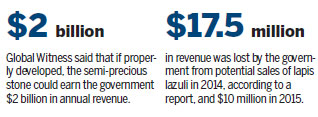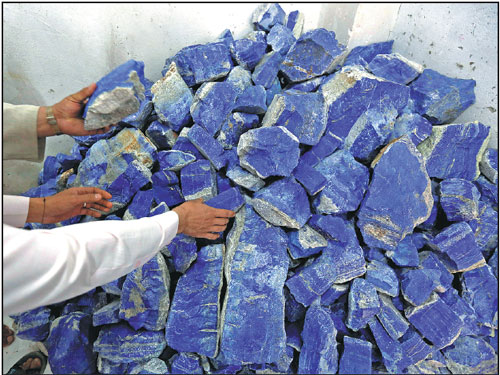Unique lapis lazuli stone helps fuel nation's long-term conflict
Afghanistan's mineral wealth is helping fuel the war that has long ravaged the country, with armed anti-government groups - including the Taliban - earning up to $20 million a year from illegal mining of lapis lazuli, a London-based corruption watchdog said on Monday.
The group, Global Witness, appealed in its new report to have lapis lazuli, a blue stone almost unique to Afghanistan, classified as a "conflict mineral."
The lapis lazuli mines are mostly concentrated in northern Badakhshan province where the stone has been mined for centuries for use in jewelry and ornaments, prized for its bright blue hues.
The province has been "deeply destabilized" by violent competition for control of the mines between local strongmen, lawmakers and the Taliban, Global Witness said.
Badakhshan is also a microcosm of what is happening across the country, as mining has become the Taliban's second biggest source of income, after drugs.
The Taliban, who have been fighting to overthrow the Kabul administration for more than 15 years, control the production of opium poppies, mostly in the southern province of Helmand, the raw material for most of the world's heroin. The drugs trade is worth up to $3 billion a year, experts have said.
Afghanistan's mineral and petrochemical assets are believed to be worth billions of dollars, but the government does not have the money or expertise to develop them, and international firms are deterred by the deteriorating security situation.
Groups earn millions
Global Witness said that if properly developed, these assets could earn the government $2 billion in annual revenue.
The report says the government lost at least $17.5 million in revenue from lapis lazuli alone in 2014, and $10 million in 2015.
The total earned by armed groups in 2014 was $19.9 million, the group added, noting that a local strongman identified as Abdul Malek had paid $750,000 in protection money to the Taliban out of proceeds from the illegal lapis lazuli mining. Last year, Malek paid the Taliban $4 million, the report says.
Without government regulation or control, mining assets have slipped out of Kabul's control.
Global Witness said the Badakhshan lapis lazuli mines have also become a "strategic priority" for Afghanistan's Islamic State affiliate, which emerged over the past year mostly in the country's east, along the border with Pakistan.
"Unless the Afghan government acts rapidly to regain control, the battle for the lapis mines is set to intensify and further destabilize the country, as well as fund extremism," Global Witness said.
The government banned lapis lazuli mining in early 2015 as the mines could not be secured, Afghan officials told The Associated Press.
|
Men sort lapis lazuli inside a shop in Kabul, Afghanistan, on Sunday.Reuters |

(China Daily 06/07/2016 page11)















